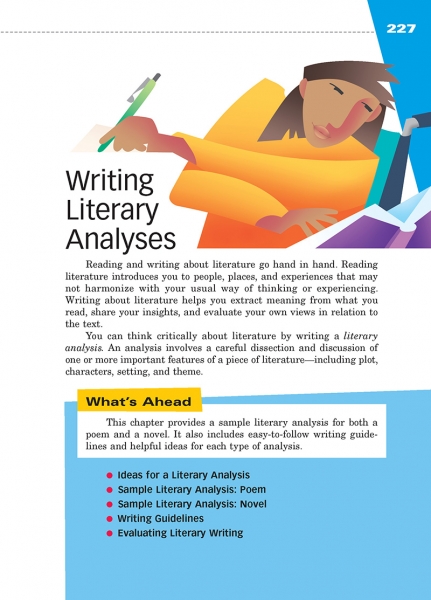Page 227 from

Start-Up Activity
Ask students what their favorite movie is. Make a list on the board. After listing about ten movies, take a poll to see which movies people like most. Point to a movie and ask students to raise their hands if they like it. (They can vote for more than one movie.) Afterward, focus on the most popular movie and ask the class to say what is so good about it. Gently guide them to talking about characters, plot, setting, and theme:
-
"Tell me about the characters in this movie."
-
"So, what are these characters doing, mainly?"
-
"Where and when did this take place?"
-
"So, what do you think this movie is saying about life?"
Let your students know they have just conducted a literary analysis (though, of course, the topic was a movie instead of a book). They will learn how to do the same thing in writing in this chapter.
In addition to the models in this chapter, share with students other responses to literature.
Think About It
“Every great film should seem new every time you see it.”
—Roger Ebert

Start-Up Activity
Ask students what their favorite movie is. Make a list on the board. After listing about ten movies, take a poll to see which movies people like most. Point to a movie and ask students to raise their hands if they like it. (They can vote for more than one movie.) Afterward, focus on the most popular movie and ask the class to say what is so good about it. Gently guide them to talking about characters, plot, setting, and theme:
-
"Tell me about the characters in this movie."
-
"So, what are these characters doing, mainly?"
-
"Where and when did this take place?"
-
"So, what do you think this movie is saying about life?"
Let your students know they have just conducted a literary analysis (though, of course, the topic was a movie instead of a book). They will learn how to do the same thing in writing in this chapter.
In addition to the models in this chapter, share with students other responses to literature.
Think About It
“Every great film should seem new every time you see it.”
—Roger Ebert